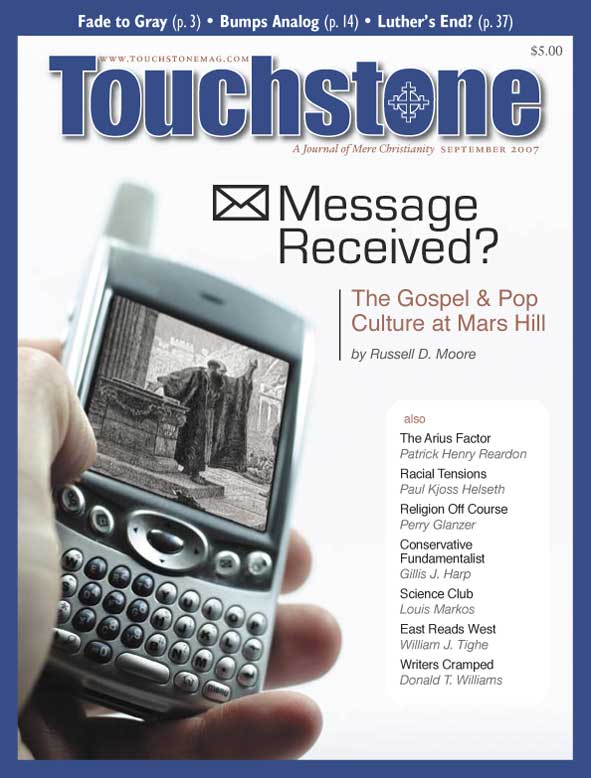Elect from Every Nation
Racial Reconciliation Won’t Happen If We Don’t Take Ephesians Seriously by Paul Kjoss Helseth
Principled opposition to the pursuit of “racial reconciliation” in the church is not in itself evidence of intercultural incompetence. It can be evidence of eagerness to safeguard the primacy and sufficiency of the gospel in the life of the church by insisting that believers have already been reconciled to God and to one another by the Cross of Christ.
I was reminded of this when reading an article in Christianity Today, adapted from a book that had appeared a couple of years before, whose authors argued that the “purpose and passion” of Jesus’ ministry centered on his “radical” desire to see the house of the Lord become “a house of prayer for all the nations.” They argued that following the death, resurrection, and ascension of Jesus, the challenge of “implementing” his vision of “multicultural worship” passed to his early followers, who then made it a reality by forming inclusive communities in which Jews and Gentiles could pursue reconciliation.
“We even go so far as to say that a Christian, by biblical definition, is a follower of Jesus Christ whose way of life is racial reconciliation,” they wrote, declaring that “the future of Christianity in the 21st century depends on practical, living examples of authentic reconciling faith.”
The One New Man
The article disturbed me, for in my estimation, by speaking of reconciliation as a “goal” that believers must strive to achieve through efforts to reduce “racial division and inequality” in the church, the authors were coming perilously close to supplanting the gospel of Jesus Christ with a version of the social gospel, one that defines reconciliation in extra--biblical terms and as a consequence breeds what Thomas Sowell calls a spirit of “self--congratulation.”
In Ephesians Paul speaks of what God accomplished on the Cross as an established reality (2:11–22). Through the Cross, God reconciled believers to himself and to one another by creating “one new man” in Christ Jesus. According to Paul, we are now at peace with God and with each other because Christ abolished “in his flesh” the “enmity” that separated us from his Father and from one another.
But what was this “enmity” that Christ abolished? Paul explains that it was the “law of commandments and ordinances” that excluded Gentiles from “the commonwealth of Israel” and “the covenants of promise,” and which itself was the basis for racial alienation in the Old Testament.
His point is simply that Christ has already reconciled believers to God and to one another by removing the objective source of their estrangement. From this it follows that those who are in the “one new man” by faith are now unified and members of the same “household of God,” and that the reluctance to acknowledge this reality calls the redemptive historical significance of the Cross into question.
It seems to me, therefore, that Ephesians 2 is relevant to Christian discussions of race neither because it suggests that racial reconciliation is a future reality that has yet to be realized in the life of the church, nor because it lends credence to the notion that Christianity’s future depends on our eagerness to pursue a social agenda of one sort or another. Paul’s teaching is relevant, rather, because it establishes that the reconciliation of believers to God and to one another is the reality that was accomplished by Christ that we are commanded to believe and maintain in keeping with the established nature of the good news we proclaim.
Since Christ has abolished the enmity and already made believers from diverse backgrounds one “in his flesh,” we ought not to challenge the sufficiency of his work by presuming that the intercultural unity of the church is a future reality that depends for its realization on our efforts to implement a particular vision of social justice, as if the objective source of racial alienation in the church still needed to be removed. Rather, we must believe what God says about the established unity of believers in the “one new man” by being diligent to preserve what has already been realized in him.
I concluded that if we have this kind of faith—the kind of faith that preserves what has already been realized precisely because it is alive (James 2)—we will labor to fulfill the Great Commission by encouraging individuals from “all the nations” (Matt. 28:19) to be reconciled to God and to one another by becoming disciples of Christ. In other words, we will point them to the Cross and encourage them to submit to the demands of the One who purchased their reconciliation for them, the One who says about their reconciliation, “It is finished!” (John 19:30).
A Certain Color
Eventually I discussed this with my friend Walter, who was largely sympathetic to the authors’ argument.
He first objected that while believers have already been reconciled to one another in Christ, as I argued, many are still estranged from believers who are not like them because social injustices still pervade the church. He therefore insisted that faithfulness to the gospel requires us to take concrete steps to make theological reconciliation a sociological fact in the life of the church.
What does it mean, I responded, to say that the reconciliation wrought by Christ is theologically “true” on the one hand yet not a sociological “fact” on the other? While an individual Christian may be alienated from other Christians (and for a host of reasons, not just racial), I did not see how we could affirm that estranged peoples have been truly reconciled in one sense and truly not in another.
Does the Bible call us to be reconciled to individuals against whom we have sinned or who have sinned against us? Indeed it does. But does the Bible call us to be reconciled to a member of a particular group simply because we are members of another group? Have we really sinned against members of a particular group—and thus created real, objective estrangement that cries out for reconciliation—simply because, for example, we wear a certain color of skin?
I suggested to Walter that some Christians might think this way because they have allowed a kind of Marxist social analysis to eclipse biblical theology, and concluded that one group of Christians is guilty solely because they are members of an “oppressive” community of one sort or another.
White, Wealthy & Western
I concluded that while believing individuals do need to pursue reconciliation with other believers when they are objectively estranged, they need not strive to make the reconciliation of entire peoples a sociological fact in the life of the church because Christ has already taken the objective source of corporate estrangement—the “law of commandments and ordinances”—out of the way. To say otherwise requires accommodating the kind of pernicious groupthink that empties Ephesians 2 of real substance.
Walter responded by arguing that although believers are already one in Christ, the deeper reality of this unity has yet to be realized in the life of the church due to the collective nature of moral responsibility.
It seems obvious to me, he said, that I not only commit individual sin, but that I am also part of a people that commits collective sin. As a member of that group (white, wealthy, and Western) I know that I have helped perpetuate racism and oppressive structures, actions, and institutions, and for this reason I am guilty of sinning against those in other racial and ethnic groups, albeit inadvertently.
You may call this a collectivist notion, he continued, but I call it a biblical sense of community versus an individualistic sense of personhood. He concluded that my view of reconciliation is more individualistic than the biblical view, which recognizes an ongoing need for reconciliation not only between individuals, but also between racial or ethnic groups, as in Acts 6, which describes the racial tension caused by the mistreatment of Greek--speaking Jewish widows.
I appreciated Walter’s repeated allusions to the already/not yet nature of our life in Christ. It is a distinction and tension Christians must never forget, lest we try to make the not yet into the already or treat the already as if it were not yet.
But I was troubled that he affirmed the “already” on the one hand yet simultaneously denied it on the other, by insisting that the reconciliation of estranged peoples is an ongoing process that believing individuals must make a reality in the church. The reason for this, I thought, was that he in fact had come to think of American racism in what Shelby Steele calls “essentially Marxist” terms.
He had come to believe, in other words, that racism is not primarily “an ugly human prejudice” that manifests itself from time to time in acts of bigotry. Rather, it is a “global” structural defect that corrupts entire social systems and can be corrected only through the principled social engagement of individuals with a progressive sense of compassion.
Since Walter was convinced that those who are white, wealthy, and Western generated the social structures that oppress minorities both inside and outside the church, he insisted that they must be reconciled to believers in other ethnic and racial groups because they continue to be guilty of perpetuating what Steele calls the “deterministic, structural, and systemic power” of “institutional” racism.
Although he conceded that these believers might not themselves be personally guilty of overtly racist acts, nevertheless they are still guilty of “systemic” racism because they sustain those “cultural patterns” that impersonally oppress racial and other minorities, even if onlyinadvertently.
Covenantal Solidarity
Walter had suggested that this kind of racism is manifest in Acts 6 and that in resolving the complaint of the Greek-speaking Jews, the apostles were working reconciliation in a systemic or structural sense.
The problem with this, I said, is that we are not told if the incident that precipitated the complaint was sinful or not, or if the systematic distribution of food was inherently biased against Greek-speaking Jewish widows. It does not teach any idea of collective racial or ethnic guilt, and neither, I insisted, does any other biblical passage.
I admitted to Walter that I could well be blind to my own “individualistic sense of personhood” as he suggested, but that I didn’t think so. In fact, I acknowledged that the Bible teaches a notion of collective responsibility, but I argued that it does so in terms of divinely constituted covenants, not in terms of accidental characteristics like race, ethnicity, sex, or socioeconomic status.
For example, the children of Adam are held accountable for Adam’s sin because he is their covenant head. His guilt is legitimately communicated to the entire human race because he is the divinely constituted head of all those who are “in” him.
I reminded Walter that if his notion of collective responsibility is warranted biblically, he must find a passage that teaches explicitly, or by good and necessary inference, that collective sin, and therefore collective guilt, are premised in Scripture upon something other than a covenant, something like skin color, ethnicity, sex, or socioeconomic status. I suggested that this is not possible, particularly when one considers that such characteristics are of incidental significance in the economy of the New Covenant.
This, then, is why I am convinced that conceiving of racism and reconciliation in collectivist terms undermines the redemptive historical significance of texts like Ephesians 2—and, I ought to say, the blood-bought unity of the church.
Gospel or Moralism?
Walter offered one final objection to my argument. If Christ’s work on the Cross really was fully sufficient to reconcile believers to God and to one another, he asked, how are we to explain the enduring existence of racial tension in the church? Doesn’t the persistence of racism suggest that not only particular believers need to repent of their racist attitudes, but that the collective identities of racist churches need to be shaped in the image of Christ as well?
This was a reasonable question, but one, I thought, that failed to make some crucial distinctions. I was not suggesting that Christians ought to cite the finished work of Christ as justification for ignoring real problems in the church resulting from racial or other differences. I was concerned, though, that we address these issues in a manner that is biblically faithful and theologically sound, and this is what is imperiled by the reflexive groupthink so often at the center of these discussions.
If even believers who are not themselves personally guilty of overtly racist acts are nonetheless impersonally guilty of systemic racism due to their inadvertent complicity in the collective sin of their racial, ethnic, or socioeconomic community, we simply cannot say that Christ’s work on the Cross was fully sufficient to reconcile believers to God and to one another. For in this case, the objective source of our enduring estrangement—which Walter presumed related to the accidental characteristics of one group or another rather than to a lack of access to the “covenants of promise”—remains in place.
To put it differently, when any kind of non--covenantal grouping is presumed, we cannot say that Christ has taken the objective source of estrangement out of the way, that “he himself is our peace,” and that those who are “in Christ Jesus” in fact are unified (Eph. 2), for the accidental characteristics that distinguish us from one another also ground a kind of corporate sin and guilt for which attempts at reconciliation must continually be made.
Indeed, the kind of sin and guilt that this way of thinking presupposes is the kind of sin and guilt for which lasting reconciliation simply cannot be made, for it is the kind of sin and guilt for which no one can claim personal responsibility (unless, of course, people ought to repent for being white, wealthy, and Western) and for which there is no covenant head to make a “once for all” (Heb. 9:12) atonement (I am not aware of a covenant head exclusively for white, wealthy Westerners, for example).
This kind of thinking needs to be forcefully repudiated, then, because it empties the work of Christ of its reconciling sufficiency by undermining the central affirmation of biblical revelation. Indeed, it supplants the gospel of Jesus Christ with a version of the social gospel that grounds reconciliation not in the finished work of Christ but in the social and political activity of those who are eager to enact a particular vision of “social justice,” and thus it reduces the Christian religion to a form of moralism that, like all forms of moralism, strives for reconciliation by attempting to add to the work of Christ.
The Already/Not Yet
This discussion with Walter led me to propose that when we do encounter racial sin in the church, we ought not to treat that sin as “the tip” of a “global” iceberg so that our response “will be to the measure of the iceberg rather than to the measure of the tip,” as Steele so aptly puts it.
Rather, because Christ has already removed the objective source of “global” estrangement, we need to speak prophetically to our brothers and sisters in Christ by exhorting those who are estranged from one another because of racial sin to turn from their sin and be by faith what they already are in Christ. We are also to warn them that if they don’t turn from their sin and thus don’t “maintain the unity of the Spirit in the bond of peace” (Eph. 4:3) by living with other believers in love, they ought not to presume that they are members of Christ, because those who are in Christ keep his commandments (John 14:15), including his commandment to love one another (John 13:34–35).
In short, we need to deal with the real tensions that rightly concerned Walter and the authors of the article that stimulated my thoughts, by taking both the “already” and the “not yet” components of the gospel call seriously. We do this, not by accommodating the “already”-destroying implications of one kind of non-covenantal groupthink or another, but by making prophetic use of the “keys of the kingdom” (Matt. 16:19; 18:15–20), which are the divinely appointed means to ensuring that believing individuals will inherit the “not yet” promises of their life in Christ.
For the record, please note that since I affirm what Scripture teaches about the established unity of believers in Christ, I am eager to say that Christian institutions are enriched in every respect when they are filled with believers from as many cultural backgrounds as possible. All Christians ought to rejoice at the prospect of worshiping in a Revelation 5 and 7 kind of Christian community, for the kingdom of God in fact is multicultural in the plain—as opposed to the ideological—sense of the word.
All Christians ought also to be concerned, however, about the means used to achieve this good end. Indeed, the means to a community that reflects the diversity of the universal church in our day is not found in theimplementation of an agenda that is informed by one vision of social justice or another.
Indiscriminate Proclamation
Rather, it is found in the indiscriminate proclamation of the finished work of Christ to people “from every tribe and tongue and people and nation” (Rev. 5:9), and in the exhortation of believing individuals to be by faith what they already are in Christ. God is building his church by calling his people to himself through the efforts of “authentic” believers to promote not what they presume social justice demands, but what they know the Great Commission requires.
Let us therefore oppose the pernicious groupthink that undermines the gospel by presuming to burden believing individuals with the “global” task of racial reconciliation, and let us acknowledge that Christian institutions remain faithful to their calling, and faithfully facilitate the reconciliation of the estranged, when they champion the word of the Cross “to those who are perishing” and when they exhort those “who are being saved” by its “foolishness” (1 Cor. 1:18) to lay hold of and rest upon its sufficiency as they “run with endurance the race that is set before [them]” (Heb. 12:1).
The article that stimulated the author’s reflections, “All Churches Should Be Multiracial” by Curtiss Paul DeYoung, Michael O. Emerson, George Yancey, and Karen Chai Kim, appeared in the April 2005 issue of Christianity Today.
Don’t Cipher Me
Some have argued that all churches have collective identities based in part on accidental characteristics and that these identities ground the corporate nature of their moral responsibility. I contend we ought to think in terms of “cultures” rather than in terms of “collective identities.”
Whereas “cultures” are complex sociological realities that are larger and greater than—yet still essentially different and distinct from—the sum of their individual parts, “collective identities” are contrived social constructions that presume to determine the identities of the individual parts. I live in American culture (a very complex and varied thing), but I am inescapably a “white Western male.”
“Collective identities,” in other words, tend to reduce individual human beings to what Shelby Steele calls “ciphers” or “non-individuated” members of a particular group or class. They assign to particular persons a contrived and reductionistic identity that may or may not accurately represent who those persons really are, and they read their every action and word as an expression of that identity.
Importing this kind of thinking into the discussion of race is problematic, not only because it lacks biblical support and leads ultimately to the corruption of the gospel, but also because it robs individuals of their ability to speak prophetically to particular situations. If our identities are essentially bound to the identities of our various groups, how can we get outside of our groups so that we can bring the truth of Scripture to bear on problems that need addressing?
In short, we cannot. However, if we think of ourselves as living in a culture but not as being defined either by that culture or by a collective identity of one sort or another, we can speak prophetically to particular situations and thereby be transformers of cultures, for cultures, properly understood, in no way destroy our individuality.
— Paul Kjoss Helseth
Paul Kjoss Helseth is Associate Professor of Christian Thought at Northwestern College in St. Paul, Minnesota. He has contributed to a number of publications, and most recently helped edit Reclaiming the Center: Confronting Evangelical Accommodation in Postmodern Times (Crossway Books). He, his wife Marla, and their newborn daughter are members of Good Shepherd Presbyterian Church (PCA) in Minnetonka, Minnesota.
subscription options
Order
Print/Online Subscription

Get six issues (one year) of Touchstone PLUS full online access including pdf downloads for only $39.95. That's only $3.34 per month!
Order
Online Only
Subscription

Get a one-year full-access subscription to the Touchstone online archives for only $19.95. That's only $1.66 per month!
bulk subscriptions
Order Touchstone subscriptions in bulk and save $10 per sub! Each subscription includes 6 issues of Touchstone plus full online access to touchstonemag.com—including archives, videos, and pdf downloads of recent issues for only $29.95 each! Great for churches or study groups.
Transactions will be processed on a secure server.
more from the online archives
calling all readers
Please Donate
"There are magazines worth reading but few worth saving . . . Touchstone is just such a magazine."
—Alice von Hildebrand
"Here we do not concede one square millimeter of territory to falsehood, folly, contemporary sentimentality, or fashion. We speak the truth, and let God be our judge. . . . Touchstone is the one committedly Christian conservative journal."
—Anthony Esolen, Touchstone senior editor









